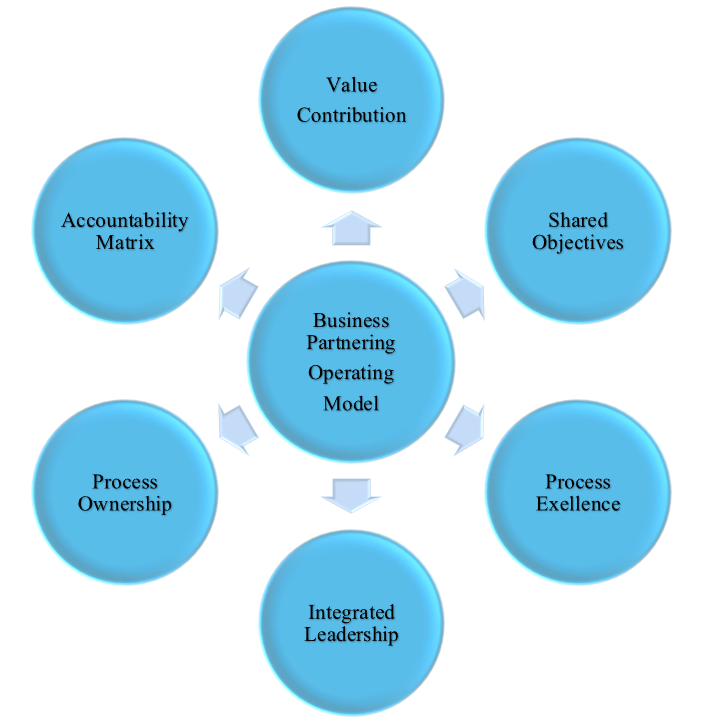Global Business Services Partnering Operating Model
For over two decades, organizations globally have leveraged shared services to optimize processes, enhance controls, and reduce costs. While these benefits remain relevant, the expectations for leading Global Business Services (GBS) organizations have significantly increased. Mature GBS organizations now provide strategic value in specialized areas such as tax compliance, statutory reporting, project controlling, and credit management; alongside strategic initiatives in project-based operations, change management, and innovation, beyond traditional cost and operational efficiency gains. Consequently, key stakeholders and business partners perceive GBS as a strategic ally rather than merely a transactional processing center. With the maturation of GBS, the Partnering Operating Model is becoming increasingly strategic. Figure 1 represents the Global Business Services Partnering Operating Model.
Figure 1 The Global Business Services Partnering Operating Model
Value Contribution
Global Business Services organizations deliver distinct and agreed-upon value to corporate functions, encompassing quality, efficiency, data management, transformation, and process solutions. GBS integrates into the value chain of corporate functions, contributing to their strategic evolution. The Business Partnering Operating Model shifts GBS from isolated functional shared services to a comprehensive end-to-end process lifecycle. The rise of digitalization enables GBS to offer value-added benefits that transcend cost savings. By integrating automation, visualization, analytics, and other digital tools, GBS can support corporate functions more effectively. Automation of low-complexity activities presents opportunities to retrain and refocus GBS on higher value-added areas.
Shared Objectives
To bring strategy to life and provide a good return on investment, corporate functions and GBS organizations must focus on shared objectives. GBS objectives must align directly with those of corporate functions, enabling GBS to drive the introduction of new business models, the development of new products and service offerings, and spearhead innovation. As companies reassess their core objectives, they increasingly focus on the evolving technology, data, and talent landscape. Consequently, automation and upskilling play critical roles in the modern GBS framework. GBS's unique vantage point aligns it closely with corporate strategy.
Process Excellence
GBS drives innovation by offering expertise-led services and using technology and data to redesign processes and enhance performance outcomes. GBS organizations are increasingly viewed as trusted providers of process excellence and incubators for innovation, particularly in areas like predictive analytics, visualization, and robotics. Leading GBS entities continue to advance process excellence, moving beyond traditional transaction processing. Changes in the cost-benefit equation, driven by new technology and an evolving labor market, are reshaping GBS's approach to service delivery towards GBS Centers of Expertise.
Integrated Leadership
Integrated leadership is a critical element of the GBS Business Partnering Operating Model. This next generation of shared services necessitates that GBS focuses on core management skills, transformation skills, and innovation capabilities in analytics and digital technologies. GBS must demonstrate the ability to innovate while operating the business. Collaborative leadership platforms enable effective decision-making, project-based operations, continuous improvement, and value management. Integrated leadership facilitates co-decision-making with corporate functions on critical areas such as knowledge and competencies, digitalization, analytics, and hiring.
Process Ownership
GBS drives organizational innovation by offering expertise-led services and leveraging technology and data to redesign end-to-end processes, enhancing performance outcomes. GBS focuses on transformational initiatives, including design thinking, user experience design, next-generation enterprise resource planning, and data management and science. Many organizations leverage GBS to complete high-impact strategic initiatives. Given their comprehensive understanding of end-to-end processes and organizational scale, GBS is uniquely qualified to align and improve processes accordingly.
Accountability Matrix
The role of GBS is pivotal in creating strategic value, ensuring process effectiveness and efficiency, and enhancing the operating model through maintained ownership and accountability within relevant corporate functions. An accountability matrix requires an in-depth understanding of stakeholder priorities, with jointly developed and maintained innovation plans. It clarifies accountability and responsibility for each task throughout end-to-end processes, framing joint governance and management with distinct responsibilities.
Closing Thoughts
GBS organizations with a mandate to drive innovation are selectively adopting the empowered Partnering Operating Model. This model grants GBS greater autonomy to drive change, take an end-to-end view and ownership of processes, and invest in continuous improvement and transformation capabilities. Such an approach ensures that GBS remains at the forefront of driving strategic value and organizational innovation.




